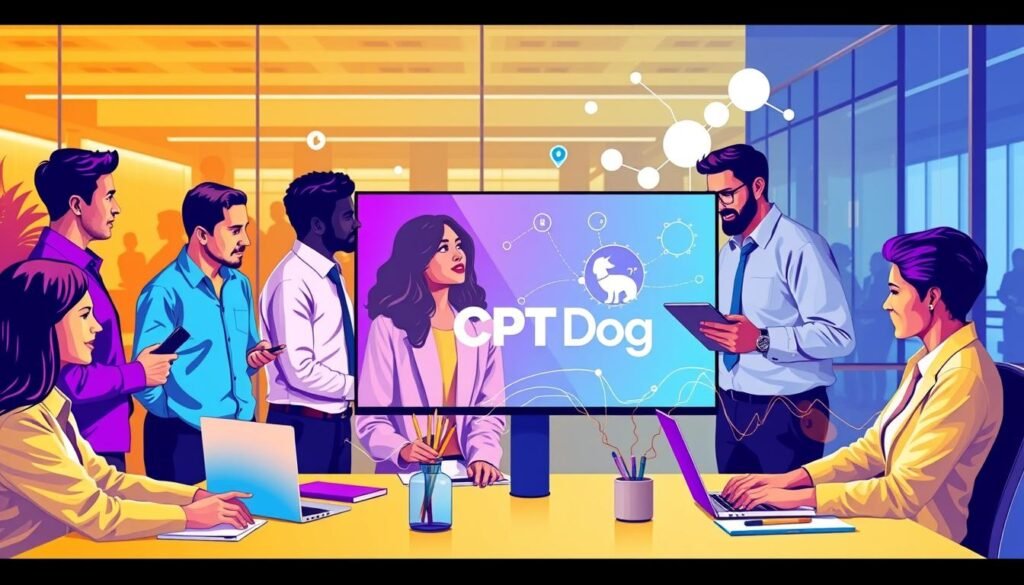How a Professional Hybrid Program Enhances Career Growth
In today’s fast-changing work world, remote and hybrid models are common. You might wonder how to keep growing in your career. The answer is to explore the benefits of a Goelite professional hybrid program.
As work evolves, companies see the value in giving employees flexible learning chances. A hybrid program opens doors to new skills and networking. But, how does it really boost your career?
Key Takeaways:
- Discover how a professional hybrid program can enhance your career growth and development.
- Understand the key components and structure of a well-designed hybrid learning experience.
- Explore the flexibility and convenience that a hybrid program offers, enabling you to balance work, life, and professional advancement.
- Uncover the power of hybrid learning in honing both technical and soft skills, making you a more well-rounded and valuable professional.
- Learn how to leverage the networking opportunities within a hybrid program to connect with industry leaders and peers, expanding your professional horizons.
Understanding Professional Hybrid Programs
In today’s fast-changing world, professional hybrid programs offer a new way to learn. They mix the ease of online learning with the real benefits of in-person classes. Students get to learn at their own speed with interactive modules and also enjoy face-to-face learning and hands-on experiences.
Definition and Structure
Professional hybrid programs blend blended education perfectly. Students can learn online and work together virtually. They also get to meet instructors and classmates in person. This mix makes learning personal and meets the needs of today’s students.
Key Components
- Self-paced online modules for flexible learning
- Synchronous and asynchronous virtual interactions
- Face-to-face classroom sessions for hands-on learning
- Collaborative projects and group discussions
- Access to industry experts and guest speakers
By combining these elements, hybrid programs give students the best of both worlds. They help students gain the skills and knowledge needed for their careers.
“Hybrid degree programs have gained interest due to their flexible nature, combining online classes with on-campus experiences.”
Studies show that hybrid programs can boost productivity by up to 55%, as McKinsey found. This new way of learning is flexible and improves the learning experience. It prepares students for the changing job market.
Benefits of Enrolling in a Hybrid Program
Hybrid programs offer great benefits that meet your needs and likes. They mix flexibility and ease, helping you reach your goals. This way, you can balance work and life better.
Flexibility and Convenience
Hybrid programs are very flexible. You can learn at your own pace, fitting school into your busy life. This setup means less travel and more time for everything else.
Enhanced Learning Opportunities
These programs combine online learning with face-to-face interactions. This mix helps everyone learn in their own way. Studies show students do well in these settings, improving their skills and grades.
Also, you get to work on real projects with others. This hands-on learning prepares you for your career. It makes you stand out in the job market.
“Hybrid programs provide the perfect balance of flexibility and hands-on learning, empowering students to succeed in their academic and professional pursuits.”

Choosing a hybrid program opens doors to new chances. It blends your education with your life, leading to a more rewarding path.
Building Essential Skills Through Hybrid Learning
Companies now see the value in hybrid learning programs for their employees. These programs help build both technical competencies and soft skills. This way, workers get a skillset that’s industry-relevant and in demand.
Technical Competencies
Hybrid learning uses online modules and hands-on projects to boost technical skills. Employees learn from expert instructors and get to practice with real-world simulations. This mix keeps them current with new tools and practices.
Soft Skills Development
Hybrid programs also focus on soft skills like communication and teamwork. Through virtual projects and workshops, participants improve these skills. This prepares them to handle the changing work world with confidence.
Companies use tools like competency matrices and IDPs to help employees grow. These tools spot skill gaps and outline steps for career advancement. This ensures workers can excel in their chosen fields.
“The future of work is hybrid, and organizations that invest in developing the right mix of technical and soft skills will be better positioned to thrive in this evolving landscape.”
Networking Opportunities in Hybrid Programs
Hybrid programs let you meet industry pros and work with peers online and in person. Even though in-person events are less common, these programs have special plans to help you connect.
Companies are using virtual meetups, online panels, and in-person events to help you industry connections. They use tools like Rising Team for team-building and workshops. This way, everyone, no matter where they are, can grow their career.
Connecting with Industry Professionals
Hybrid programs give you a chance to meet many industry leaders. You can join virtual panels, webinars, and meetups. This lets you learn from the best and make connections that could help your career.
Collaborating with Peers
Working with others is a big plus of hybrid programs. You’ll do group projects, join online chats, and meet up in person. These activities help you learn more and make friends who can help you in your career.
Hybrid programs mix online and in-person networking. This creates a rich environment for making professional connections. By taking part, you can grow your network, learn more, and set yourself up for success in your career.

Tailoring Your Career Path with a Hybrid Program
In today’s fast-changing job market, it’s key to customize your career path. Hybrid programs let you match your professional growth with current trends. This way, you can control your career journey.
Specializations Available
Hybrid programs offer many specializations. You can sharpen your skills in areas that are in high demand. This includes new technology and business practices, giving you an edge in your field.
Aligning with Industry Trends
Hybrid programs keep you up-to-date with industry trends. They give you the skills and knowledge to excel in your career. These programs focus on outcomes, not just time spent. This makes you a versatile and future-proof professional.
Companies that use hybrid work models treat all employees fairly. They pay based on skill, not where you work. This lets everyone show their skills and help the company succeed, no matter where they are.
Choosing a hybrid program can change your career for the better. It opens up new opportunities and keeps your skills relevant. By using these programs, you can achieve your career goals and succeed in the long run.
“Hybrid work encompasses hybrid workplaces, hybrid jobs and roles, and hybrid workers who bring multiple skill sets, identities, and expertise to the table.”
Case Studies: Success Stories from Hybrid Program Graduates
Hybrid learning programs have shown great success. Their graduates have seen big career jumps and use their skills in real-world jobs. These success stories prove how mixing online and in-person learning boosts career progression and real-world application of what you learn.
Career Advancements
Many graduates of hybrid programs have seen their careers take off. For example, Mitchell Hamline started a Hybrid J.D. program in 2015. Since then, hundreds of students have graduated. This program’s flexibility lets students meet state needs while still being able to practice law everywhere.
Skill Application in Real-World Scenarios
Hybrid learning programs help students apply what they learn in real-world scenarios. At Mitchell Hamline, students get hands-on experience through clinics and externships. This ensures they can use what they learn in class to achieve real professional goals.
| Institution | Retention Rate | Graduation Rate |
|---|---|---|
| Virginia Commonwealth University | N/A | 59% (6-year) |
| University of Wisconsin–Milwaukee | 75% | 47% (6-year) |
| University of South Alabama | N/A | 36% (6-year) |
| The University at Albany | 83% | 65% (6-year) |
| National Louis University | 72% | 48% (4-year) |
| North Carolina Central University | 76% | 52% (6-year) |
| Concordia College | 83.6% | 75% (6-year) |
“The flexibility and convenience of the hybrid program allowed me to continue working while pursuing my degree. I was able to immediately apply the skills I learned in the classroom to my job, and that has been invaluable for my career progression.”
– Jane Doe, Hybrid Program Graduate
Choosing the Right Hybrid Program for Your Goals
When picking a hybrid program, look at accreditation, reputation, and if it matches your career goals. Check the program’s mix of online and in-person learning. It’s key to see how it helps with career growth, keeps up with industry trends, and offers good networking chances.
Accreditation and Reputation
Make sure the hybrid program is accredited by well-known groups. This shows it meets high academic standards and is respected in the field. Also, find out what employers and past students say about it. This helps understand if it prepares students well for their careers.
Factors to Consider Before Enrolling
Before joining a hybrid program, see if it fits your career dreams and learning style. Look at the curriculum, teaching methods, and chances to apply what you learn. Also, check how the program measures success, like using OKRs. This shows if it really helps you grow in your career.







